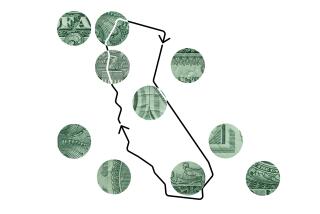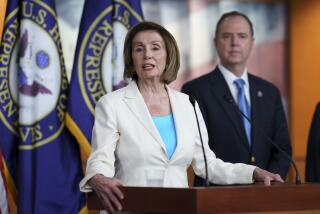Zschau Attacks Cranston Use of Mail Privilege
- Share via
In late 1984, when Democratic Sen. Alan Cranston was looking ahead to his reelection campaign this year, he asked his new campaign manager, Darry Sragow, what he could be doing better.
Sragow replied, “Reminding Californians of what you’ve been doing for them in Washington.”
By early 1985, Cranston’s office had begun to greatly increase its mailings of his constituent newsletter, “Senator Alan Cranston Reports to California.” They went out under the franking privilege, the taxpayer-financed program that pays the mail costs for members of Congress to stay in touch with their constituents.
Now Cranston’s Republican opponent, Rep. Ed Zschau, is trying to make this free mailing privilege a campaign issue.
“People in this state and around the country want something done about the federal budget deficit and cutting wasteful spending,” Zschau said Monday at a Los Angeles press conference. “I have to admit that Alan Cranston has been doing something about it--he’s been adding to it. According to the official report, he has been spending the most over the last nine months on unsolicited mail and newsletters. . . . Obviously California is the largest state, but Sen. Cranston still spends more per capita than 86 of his colleagues.”
A Senate report earlier this year showed that Cranston spent $4.8 million to mail out newsletters between July, 1985, and March, 1986, the most by any senator.
Cranston defends these mailings as important to his ability to stay in touch with Californians, noting that “the actual cost is 2.06 cents a month per constituent.” The newsletters report on issues ranging from child care and veterans’ benefits to toxic waste cleanup and foreign aid.
But Zschau does not think they are very important, referring to them Monday as “unsolicited junk mail.”
“If I am elected to the Senate, I will not be sending out newsletters at a cost to the taxpayer,” Zschau said. He announced that this week he will introduce a House counterpart to a bill by California Sen. Pete Wilson that would ban the newsletters.
Cranston’s administrative assistant, Roy Greenaway, acknowledged in a telephone interview from Washington that the senator’s office had stepped up the mailings as the election neared, but insisted it was Greenaway’s decision, not the campaign’s.
“We didn’t send out many newsletters in 1983 and ‘84,” Greenaway said, “because Alan was running for President and we didn’t think it was appropriate.”
A Senate report shows that Cranston sent out one newsletter in 1983 and three in 1984. He mailed out 27 newsletters and notices of community forums in 1985. So far this year he has sent out 16 newsletters and forum notices. By law, members of Congress up for reelection must halt the free mailings 60 days before an election.
At Cranston campaign headquarters in Los Angeles, Sragow ridiculed Zschau’s attempt to make the newsletters a campaign issue.
“While Mr. Zschau was in Los Angeles holding a press conference,” Sragow said, “Sen. Cranston was on the Senate floor fighting the nomination of the inexperienced and incompetent Daniel A. Manion to be a federal judge and opposing the Reagan Administration’s plans to back up $100 million in aid to the contras --which Mr. Zschau voted for--with direct U. S. military intervention in the war.”
Noting that Zschau also sent out newsletters as a Los Altos congressman, Sragow charged that Zschau’s desire to ban newsletters in the future was “another Zschau flip-flop.”
Between July, 1985, and June, 1986, Zschau sent one newsletter, at a mailing cost of $30,253, to constituents in his 12th Congressional District.
More to Read
Get the L.A. Times Politics newsletter
Deeply reported insights into legislation, politics and policy from Sacramento, Washington and beyond. In your inbox twice per week.
You may occasionally receive promotional content from the Los Angeles Times.










